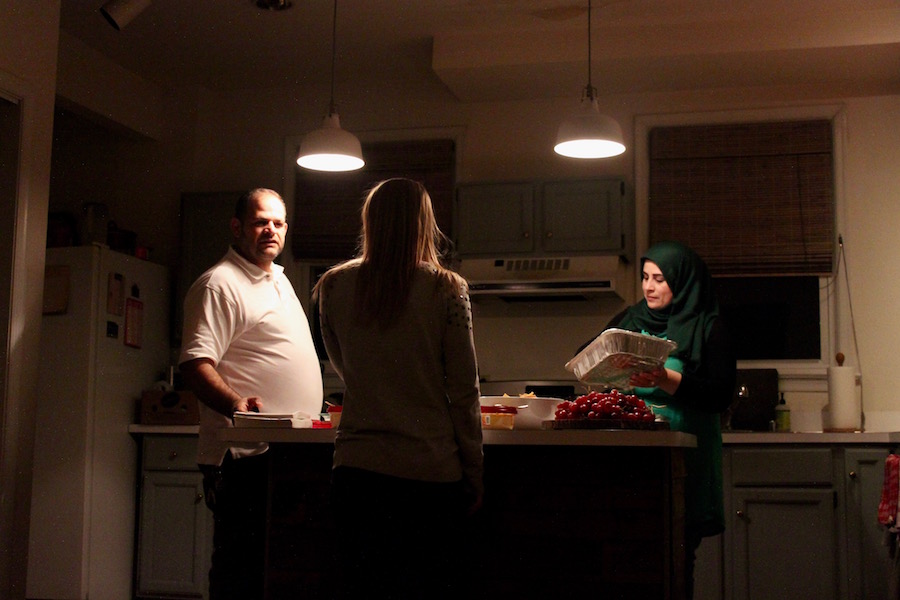Over 500,000 refugees have been accepted into the United States. since 2010, according to the State Department. Just over 1,000 were resettled in Montgomery and Prince George’s counties in Maryland last year. As these refugees try to find jobs and schools, some area residents are helping them feel at home.
Refugees and volunteers from National Community Church are building relationships as they share food, time, and assistance. The interdenominational Christian church picks up families from the airport, furnishes and decorates their homes prior to arrival, and connects refugees to family friends and mentors who can navigate the school system or take them to the doctor.
The Alhumayer family arrived in the U.S. from Syria a little over a year ago to escape the civil war. Bashir Alhumayer had worked as an electrician in Damascus, and the family lived outside the city in a mostly Christian town. As the war escalated, Bashir found himself hiding his sons and daughter from bombs and sniper fire. His wife, Ghosoun, was sick with diabetes. The family paid a smuggler to transport them to Jordan, where they lived in a refugee camp for three months.
“I hope nobody goes through what I’ve been through,” Bashir said through a translator.
The refugee camp lacked basic necessities like electricity and running water. Half the time, Ghosoun was in the hospital. “Life was hell there,” Bashir said.
The family paid a smuggler to transport them into Amman, where Bashir worked once again as an electrician. Ghosoun began to lose her vision and the family had to pay for two surgeries. Jordan was one of the only Middle Eastern countries that accepted Syrian refugees. After the family had been in Jordan for years, the United Nations High Council on Refugees moved them to Maryland.
Bashir and Ghosoun told their story to an audience of more than 40 people at a National Community Church program called, “Listen + Learn.” Bashir, who is Muslim, had crossed paths with the church soon after moving to Maryland and developed a strong relationship with the director of the church’s international missions arm, David Schmidgall.
“We try to really listen and learn,” Schmidgall said of the church. “And create environments where our people can understand difficult topics, meet people from different faiths and backgrounds, cross those lines of division, and begin to develop relationships.”
At the Listen + Learn program on Nov. 10, audience members crowded the spacious living room of Schmidgall’s home in Southeast. Bashir and Ghosoun Alhumayer told their story over ful medames, a common Arab dish made of fava beans.
During these programs refugee families share food, teach recipes, and answer questions. The church sells tickets, and all of the money goes directly to the family. “They get a few months of assistance when they get here, but then you’re kind of expected to become self-sufficient as quickly as possible,” said Jill Carmichael, director of domestic missions. “This will probably provide a full month’s rent for them,” Schmidgall said.
The Alhumayer family lives in a small apartment, with their children sharing a room. They had no choice in their resettlement location in Maryland. Only refugees with relatives in the District are placed in the city.
Some new arrivals are eligible for the U.S. Refugee Resettlement program, while in D.C. others are referred to Lutheran Social Services or the Catholic Charities Refugee Center. “Agencies are not enough,” Schmidgall said. “It’s not that they’re doing a bad job, they’re just limited.”
“Most of these families have case managers, but these case managers have huge caseloads,” said Carmichael. “How can we help support the services they’re already getting?”
The National Community Church works with refugees from many places, though most often from Syria and Afghanistan. Their faith provides motivation. “We’re called to do what Jesus did,” said Carmichael, “which is serve the poor and the oppressed.”
Schmidgall said there can be tension within families between assimilation and preservation. “We owe it to them to know and understand their world, their customs,” he said. “We celebrate their diversity, but we also invite them in to be part of our culture.”
The Alhumayer children are doing well in school, but language is an obstacle. Bashir hopes his children will go to college, although they’ve had to delay their plans for financial reasons. The family loves camping in the area, but doesn’t like American food. Bashir said he would like to open up a commercial kitchen, a Syrian restaurant. Eventually, he would like to return to Syria in peace.
“What we fear, we tend to misunderstand,” Schmidgall said. “What we misunderstand, we tend to judge.”




